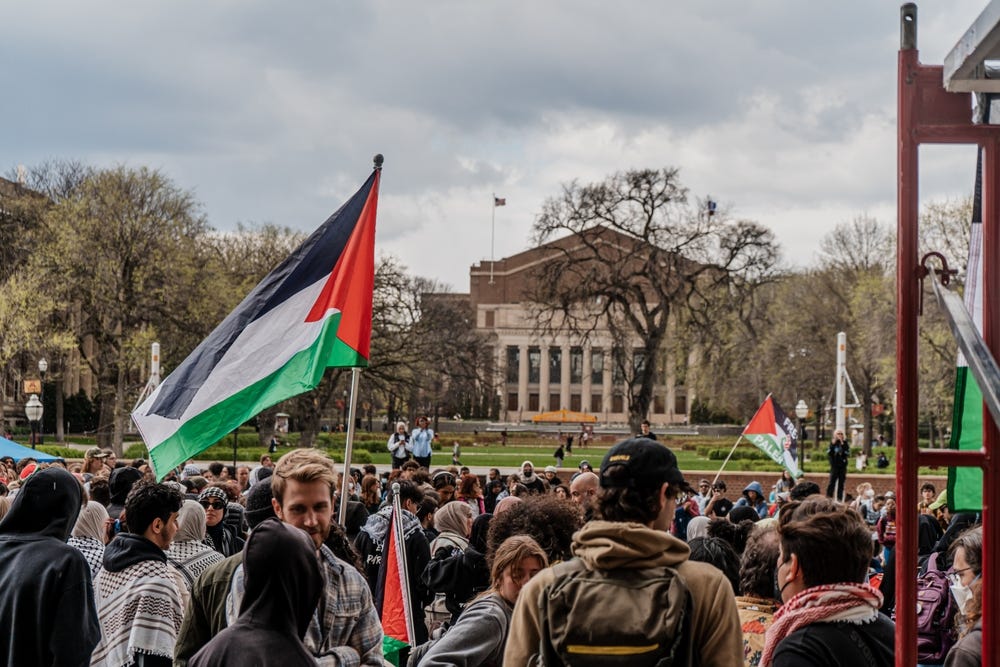Seeking Words Of Wisdom
How a 19th century French historian and George Orwell can help us better understand today’s chaos.
Campus USA, circa Spring 2024: Hamas, whose goal is not a Palestinian state but the destruction of a Jewish state, is supported by college students around the country.
In troubled times, we often turn to the wisdom of the past to help us understand the present. I offer here an example of how two writers I respect, Peggy Noonan and Matti Friedman, turned to the writings of two authors they respect to help understand a world that seems to have lost its collective mind.
How are we to comprehend American college students fervently taking up the cause of Hamas, an Arab terrorist group whose barbaric actions October 7 were consistent with their avowed mission to commit genocide against Jews?
Such sentiment can be seen, at least in part, in having its roots traced to a dramatic shift in the educational goals of our leading universities.
Last December, days after the three college presidents were unwilling or unable to say that calling for the genocide of Jews would violate their institutions’ codes of conduct, Wall Street Journal columnist Noonan wrote a piece bemoaning how our elite American universities have lost their way in recent years. She cited how they have abandoned their commitment to educational excellence and instead embraced the political and ideological agendas centering on race, gender and social engineering, with selective DEI programs that don’t include Jews.
Noonan noted that she had been reading Edmund Wilson’s 1940 classic, “To the Finland Station: A Study in the Writing and Acting of History,” with a section on Jules Michelet, a 19th century French historian and “father of modern historiography” and “searcher for truth.” Noonan writes: “The whole section reads like a tribute to the idea of learning, of understanding, of telling. It is not too much to say it is a kind of paean to the idea of the university.” She adds: “The idea of this man – a true scholar who attempts to find the honest truth – seems inapplicable to the current moment. And the reason is the three words he uses – ‘in good faith’ – to define how the historian must act.”
Noonan calls out many of today’s university scholars as not people “of the intellect, but as mere operatives, enforcers” of an ideology that seeks to champion certain groups at the exclusion of others.
Matti Friedman, a Jerusalem-based author and journalist with keen insights into media bias against Israel, writes in the Spring issue of the Jewish Review of Books how he turned to the writings of George Orwell for solace “amid the psychiatric episode triggered by the war against Hamas in Gaza.”
Orwell, he noted, “is best known for the antitotalitarian novels he wrote in the 1940s, Animal Farm and 1984, but his true genius lies in his journalism.” That’s because “he told the truth as he saw it and was not seduced by fashionable opinion, because he preferred people to ideas, and because of his incomparably clear and urgent style,” Friedman writes. “Orwell more than any other modern writer … remains the compass for those who hope to describe a bewildering world in clear English.”
Orwell’s views on war were shaped by the action he saw in the Spanish Civil War in the mid-to-late 1930s, battling General Franco and his Nazi allies. He was wounded by a bullet in the neck and came home to England, where he later wrote of the media’s complete falsehoods in reporting on the war, driven by politics rather than facts.
Friedman writes that his own experience seven decades later, working for the Associated Press in Israel, echoed Orwell’s observations described in an essay entitled Looking Back on the Spanish Civil War. In each case, Friedman says, “Western observers are guided chiefly by their own politics and imaginations” rather than by truths that belie their beliefs. That’s consistent, Friedman asserts, with how so many today refuse “to believe the details” of the Hamas atrocities of October 7 while “eager to believe a few weeks later that Israel had purposely bombed a hospital – and also the unwillingness of some on my own side to admit any civilian suffering in Gaza…”
The most powerful and shocking quote from Orwell that resonates today is his 1938 description of the dilemma posed by the horrible realities of then-modern warfare: “The only apparent alternatives are to smash dwelling houses to powder, blow out human entrails and burn holes in children with lumps of thermite, or to be enslaved by people who are more willing to do these things than you are yourself.”
What lessons would Orwell offer in response to the current chaos we are living through? Friedman memorably concludes that, based on Orwell’s “life and work, these are apparent: Majority opinion is overwhelming but often wrong. Wars look different close up than they do from afar. Time in uniform will make you wiser than time in school. Writing that lasts is more likely to appear in small journals than in the mainstream press. Those who ride the ideological currents may rise but will then sink, and in posterity only the honest observer has a chance of staying afloat.”
Finally, each of us can turn to the sacred writings and prayers of our faith for eternal lessons that comfort and inspire us:
. from Ecclesiastes (“a time to kill and a time to heal … a time for war and a time for peace”);
. to Psalms (“Pray for the peace of Jerusalem: ‘May those who love you prosper; may there be peace within your ramparts..’”)
. to the Siddur (“As for our brothers … in distress or captivity … may the All-Present have compassion on them and lead them from distress to relief, from darkness to light, and from oppression to freedom, now swiftly and soon – and let us say, Amen.”)
Shabbat shalom.




